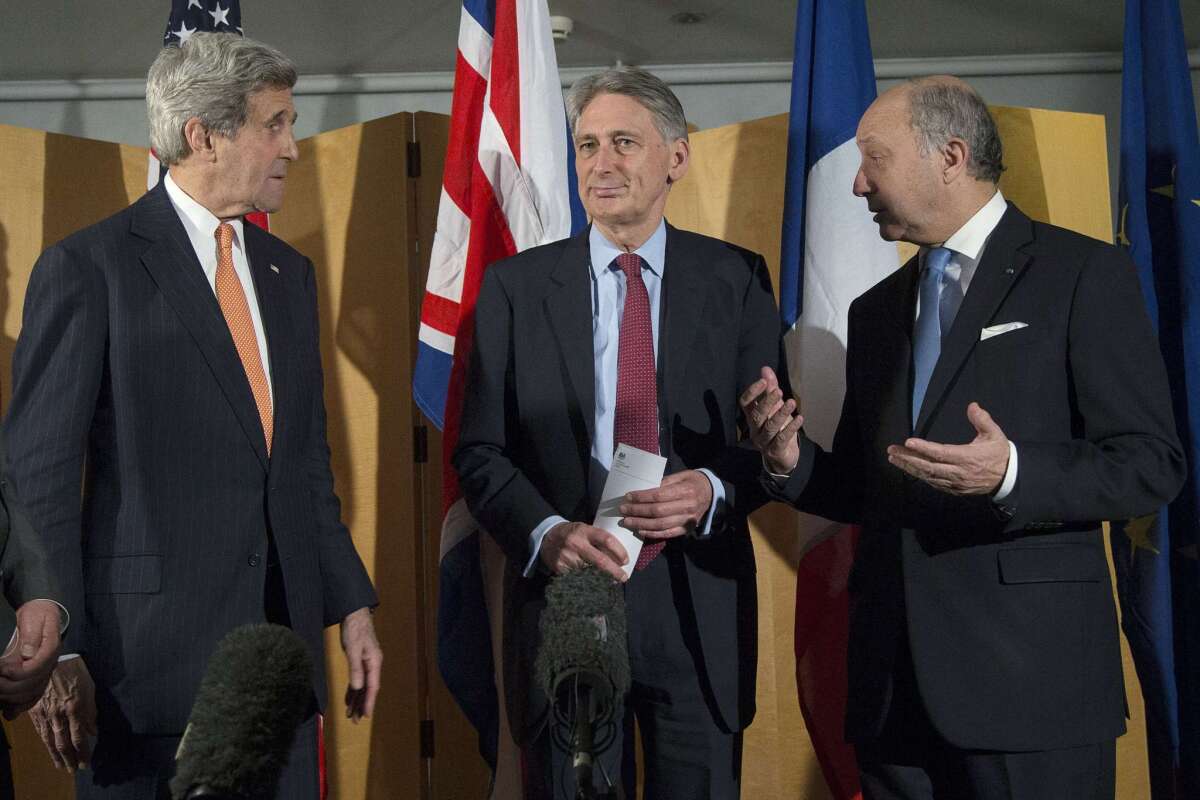Iran nuclear deal close; both sides face harsh politics at home

If all goes according to plan, U.S. officials will return home from here next week declaring they have reached a historic agreement that will restrict Iran’s nuclear program forever.
Iranian officials will be in Tehran triumphantly explaining that they have secured a deal that will free Iran in a few years to pursue its nuclear program just like any other country.
Major international agreements usually require both sides to acknowledge they’ve given ground. Because of the brutal politics of the nuclear issue, however, neither side has much room to acknowledge compromise.
As a result, over the next few months, U.S. and Iranian officials are likely to be making starkly contradictory cases about the deal they have reached, both seeking to sell it at home.
Inside windowless negotiating rooms here, “we can talk about looking for a middle ground,” said a European diplomat, who declined to be identified discussing the sensitive negotiations.
“Outside in the light, it’s harder.”
The nuclear negotiations, which have been underway for more than two years, have reached a crucial phase, with both sides indicating that a deal is near. Agreement on at least the outline of a deal could be reached in a few days, diplomats say.
After a three-day break, diplomats began converging here on Wednesday to resume talks. The new round will begin with U.S. Secretary of State John F. Kerry meeting with Iranian Foreign Minister Mohammad Javad Zarif on Thursday.
Iran’s supreme leader, Ayatollah Ali Khamenei, has set the bar sky high for what sort of deal will be acceptable, saying any agreement must preserve Iran’s “dignity and integrity” by giving it the freedom accorded any other country to pursue a civilian nuclear program.
Under pressure from Congress, Israel and Iran’s Arab rivals, the Obama administration is living under the rule of “distrust and verify.”
To prevent skeptics from trying to sink the deal, U.S. officials have to argue that even after the agreement’s restrictions expire -- it’s expected to last 10 to 15 years -- Iran will still face restrictions that would keep it from racing to develop a bomb.
Already last week, Deputy Secretary of State Antony Blinken testified to Congress that “some restraints would be removed after a significant period of time, others would remain in effect even longer, and some would last indefinitely, including a stringent and intrusive monitoring and inspections regime.”
Blinken didn’t say what curbs would be in effect indefinitely, beyond special rules for monitoring and inspections that Iran is expected to accept.
The Obama administration and five other major powers -- France, Britain, Germany, Russia and China -- have been negotiating for 18 months seeking a deal that will lift sanctions on Iran if it accepts restrictions aimed at preventing it from gaining a nuclear weapons capability. The diplomats are seeking an initial “framework” understanding by the end of March and a fully detailed comprehensive agreement by June 30.
The first-step agreement they’re seeking now, which they’re calling a “political understanding,” may be vague enough to accommodate both narratives.
The Iranians don’t want a written document at this stage, fearing it would give hostile mullahs and generals a target.
But the Obama administration needs something with enough specifics to satisfy Congress, which is clamoring for proof that the negotiators have found solutions to all the major issues.
The two sides may find a creative solution. They might, for instance, use a joint statement that asserts agreements on key points, but without a written document. The administration could brief Congress on specifics in classified sessions.
Josh Earnest, the White House press secretary, said last week that the agreement would lay out some “very specific commitments from the Iranians about their nuclear program, and about how some of their facilities are run. It would also include some very serious commitments by the Iranians to agree to a set of historically intrusive inspections.”
Philip Hammond, the British foreign secretary, said the public part of the agreement would use broad strokes.
“The objective would be to have an agreement that sets out in layman’s language what we have agreed to do,” Hammond said.
Before the negotiators can set out those general terms in public, however, they need to agree on a few more specifics behind closed doors.
At a United Nations Security Council meeting on Tuesday, U.S., French and British diplomats pressed Iran to give ground.
“Iran must now make difficult choices if it truly wishes to regain the trust of the international community,” said Francois Delattre, France’s ambassador to the United Nations.
The two most important issues are Iran’s demand to continue nuclear research and development during the duration of the deal and its demand to have sanctions, especially United Nations sanctions, lifted immediately at the outset of the deal.
The State Department announced Wednesday that the U.S. delegation now includes four additional specialists on sanctions, the United Nations and international law. That indicated that officials will focus on finding a solution to the sanctions issue over the next several days.
Iran dug in further on that issue on Saturday, when Khamenei declared that the deal would be acceptable only if sanctions were halted as soon as the agreement is signed.
Zarif said Wednesday his team is “insisting on the guidelines of the supreme leader,” Iran’s Tasnim News Agency reported.
For more on foreign policy, follow @RichtPau on Twitter.
More to Read
Sign up for Essential California
The most important California stories and recommendations in your inbox every morning.
You may occasionally receive promotional content from the Los Angeles Times.











